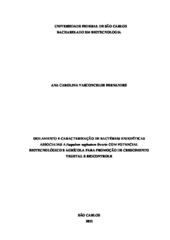Isolamento e caracterização de bactérias endofíticas associadas a Paspalum vaginatum Swartz com potencial biotecnológico e agrícola para promoção de crescimento vegetal e biocontrole

Visualizar/
Data
2022-09-14Autor
Fernandes, Ana Carolina Vasconcelos
Metadata
Mostrar registro completoResumo
Paspalum species are important constituents in native pastures of tropical and subtropical regions of the Americas. Paspalum vaginatum is a grass native to coastal areas in Brazil and is widely used on golf courses in the United States due to its robustness and tolerance to abiotic stresses such as drought, waterlogging and salinity. Bacteria (endophytic) located within this species may be partially responsible for tolerance to these extreme conditions. The use of bacteria capable of promoting plant growth as inoculants is an ecologically correct strategy to replace chemical fertilizers and improve plant production. This study aimed to isolate and evaluate the potential for solubilization of inorganic phosphate (ISF), biological nitrogen fixation (NFB), production of 3-indoleacetic acid (IAA) and antagonistic potential of
endophytic bacteria associated with P. vaginatum. The bacteria were isolated from roots and
leaves of P. vaginatum and tested in vitro for NFB, ISF, IAA production and antagonism against the phytopathogenic fungi Bipolaris sp. Among the 72 bacterial isolates tested, 42 fixed nitrogen (58,3%), 28 solubilized inorganic phosphate (38.9%), 70 produced AIA (97.2%), even in low amounts, and 12 showed antagonistic potential against Bipolaris sp. (16.7%). The 24 bacteria with the best results in the tests were identified by sequencing the 16S rDNA. The genera Bacillus sp., Pantoea sp., Enterobacter sp., Agrobacterium sp., Pseudomonas sp., Staphylococcus sp. and Streptomyces sp. were identified by the 16S rDNA gene sequencing of the 24 selected isolates.
Collections
Os arquivos de licença a seguir estão associados a este item:
